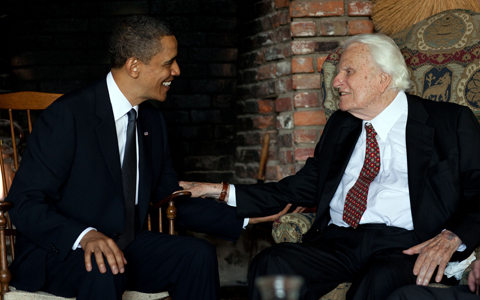President Barack Obama meets with Rev. Billy Graham at his house in Montreat, N.C., April 25, 2010. (Official White House Photo by Pete Souza)
–The first Senate procedural vote on financial regulatory reform is scheduled for late this afternoon. There’s no deal yet and top GOP negotiator Richard Shelby says reaching one today is unlikely.
–There’s been a fair amount of ink spilled on the surprising robustness of Blanche Lincoln’s derivatives plan, but how much of her proposal makes it into the final financial reform bill is still largely up in the air. One potential sign it will remain mostly in tact: Democrats have reportedly agreed to include the measure forcing banks to entirely spin off their derivatives desks.
–Populist cat nip: Bob Corker plans to introduce an amendment that would reclaim five years worth of personal earnings from the financial officers of failed firms. It’s powerful politics and policy — just the kind of thing to put to bed concerns that a resolution process would be painless for Wall Street players.
–Stephen Gandel looks at those Goldman e-mails and concludes that, while it didn’t necessarily break the law, the firm was doing more than just hedging: “Goldman was not just betting against the housing market, it was betting the house against the housing market.”
–Paul Krugman directs his ire at the rating agencies.
–The passage of Arizona’s immigration enforcement law has opened a throbbing cultural and political wound with national implications.
—Jonathan Martin writes comprehensive immigration reform is politically fraught for both Democrats and Republicans.
—Ben Smith points to a pained statement from Arizona Hispanic Republicans.
—Mark Halperin takes stock of Obama’s first term and sees a resounding success in governing:
By Election Day, 2010, Obama will have soundly achieved many of his chief campaign promises while running a highly competent, scandal-free government.
It’s easy to lose sight of in the daily grind, but, as with Obama’s candidacy, you can amazingly count the major setbacks on one hand. Another parallel to the campaign: Halperin notes wise personnel decisions play no small role in his success.
–Nancy Gibbs and Michael Duffy have a nice account of the president’s visit to Billy Graham’s home.
—Dan Balz looks for meaning in Charlie Crist’s looming decision whether or not to remain in the Republican party. A taste:
If Crist goes the independent route, his decision will be interpreted as the most significant example yet of the “tea party” takeover of the GOP, given the early and enthusiastic support Rubio received from that movement’s activists and supporters.
But the Crist saga cannot be so neatly categorized. This has been an unprecedented establishment conservative revolt against a sitting governor seen as putting personal ambition ahead of political conviction.
–Adam Smith and Steve Bousquet chronicle his rise and fall.
–Arlen Specter gets nods over Joe Sestak from the Inquirer and Post-Gazette.
–Illinois Senate candidate Alexi Giannoulias is forced to use his first TV spot to defend himself after the FDIC seized his family’s insolvent bank.
–The president gears up for the midterms.
–Jeff Zeleney and Adam Nagourney explain how everything’s at play.
–Gabriel Sherman explores the commercialization of Sarah Palin at length.
–And Obama’s judicial philosophy: empathy reworded.
What did I miss?


